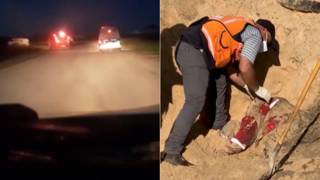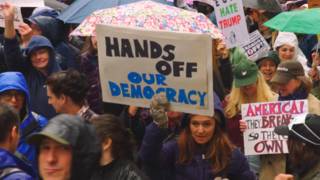
The French government has declared a state of emergency in response to the youth-led uprising that began nearly two weeks ago, and has spread to over 300 towns and cities across the country as well as Brussels and Berlin. We go to Paris to speak with French-born journalist Naima Bouteldja and French-American activist Julia Wright about how the current civil unrest is rooted in decades of social discrimination. [includes rush transcript]
Under the emergency laws, the government can implement curfews, carry out house searches and ban public meetings. The French newspaper Le Monde criticized the government’s decision to invoke laws that were originally drawn up 50 years ago to quell the independence movement in the former French colony of Algeria. The paper’s editors wrote “exhuming a 1955 law sends to the youth of the suburbs a message of astonishing brutality: that after 50 years France intends to treat them exactly as it did their grandparents.” One of the last blanket curfews in Paris was imposed solely on Algerians in 1961. This led to mass protests and a severe crackdown by the French police. On October 17. 1961 police killed as many 200 pro-independence Algerians in what is now known as the Paris Massacre. Police were accused of throwing Algerian demonstrators into the River Seine after they had been beaten unconscious.
Over the past two weeks the police have not resorted to such force but there have been mass arrests. Since the uprising began police have detained more than 1,500 people, many of them of Arab or African descent. In recent days over 300 towns and cities have been affected by the unrest including the Belgian city of Brussels and the German city of Berlin. On Tuesday night, youths threw firebombs at police and set cars ablaze in the French city of Toulouse just as Interior Minister Nicolas Sarkozy was visiting the area. Over the past two weeks an estimated 6,000 cars have been set ablaze.
- Julia Wright, coordinator of the International Committee in Solidarity with Mumia Abu-Jamal and Political Prisoners in Paris. She is the daughter of renowned writer Richard Wright, who authored the classic “Native Son.”
- Naima Bouteldja, a French-born journalist of North African descent. She has written about the French uprising for the Guardian of London.
Transcript
AMY GOODMAN: To talk about the latest in France, we’re joined by three guests. On the phone from Paris is Julia Wright. She’s coordinator of the International Committee in Solidarity with Mumia Abu-Jamal and Political Prisoners in Paris. She’s the daughter of the renowned writer Richard Wright, who authored the classic, Native Son, also about alienation and about racism. On the phone with us also is Naima Bouteldja. She is a French-born journalist of North African dissent, has written about the French uprising for The Guardian of London. We will go first to you, Nadja. Can you explain to us what you understand at this point? Nadja, are you with us?
NAIMA BOUTELDJA: Are you speaking about me, Naima?
AMY GOODMAN: Yes. Naima, sorry.
NAIMA BOUTELDJA: Yeah, I think the whole unrest is really a reflection of years and decades, even, of very heavy social discrimination and exclusion and a very heavy, as well, impunity as regard to racism and impunity as regard to a very scornful statement and even racist statement from the French intelligence — the French establishment, sorry.
AMY GOODMAN: Can you talk about the communities and where the immigrants or the immigrants’ children are from that are now in this uprising?
NAIMA BOUTELDJA: Yes. I think it’s mainly led by — I don’t know how much you know about the ethnic minorities in France, but in these suburbs, you have mainly — I mean, you have to first visualize them: It’s a huge concentration of tower blocks. I mean, I live now in the U.K., and we haven’t got anything like that, even if you have ethnic conclaves, as well, here. But it’s nothing comparable to over there. So you have this huge concentration of tower blocks, very often in the margin of big cities such as Paris, Toulouse, Marseille, and with a very heavy concentration of French from North African background and from also the Sub-Sahara. And you have also, of course, the minority of French, from working class, white French. And the riots have been led mainly or have been involving French from the second and third or even fourth generations. So people who were born in France, who very often haven’t got much link with the countries of their parents, and who are treated and ghettoized as second-class citizens.
AMY GOODMAN: Julia Wright, from your perspective in Paris, can you talk about what is happening right now?
JULIA WRIGHT: Well, I had a very eerie feeling of déjà vu. And you’ll forgive me, Amy, for being haunted by the first page of Black Boy, my father wrote, when at four years old he felt left out, and they were poor, and he was hungry, and nobody was paying attention to his brother and him. And he wandered listlessly about the room. And he stood before the shimmering embers, fascinated by the quivering coals. And a new idea of a game grew and took root in his mind. Why not throw something into the fire and watch it burn? And then, why not burn the curtains? And then, when the adults realize the house is on fire, he hides under the house. And what really struck me when I reread these pages a few moments ago was, yes, the house was on fire, but I was determined not to leave my place of safety.
And I’ve been working, Amy, with the youth of the suburbs who are now in this state of unrest. And there was an incident on the 27th of October that sparked this accumulation of so-called riots. I don’t like the word “riots.” Anger, anyway. I just have to tell you about this anecdote. Two kids were walking a little late, okay. Maybe they had some weed in their pocket. Maybe they didn’t. But they were the wrong color, and they were the wrong age. And they were seen by two policemen in helmets, what we call gardes mobiles, with their Plexiglas shield and their whatever you call it, the electric whatever, like prodding cattle, you know?
And these kids, it was like in a video game. They just ran. That was their reflex. And they climbed the fence, and they didn’t look at the notice on the fence. And there they were in the middle of a high-power voltage electric generator, and they were electrocuted to death. Nothing was left of them. And this was the spark. And it’s so telling to us who still have the death penalty in the United States and, in fact, the electric chair, where these two kids had no chairs to burn on. And I still feel eerie, because as I work with youth, 20 years — 20 days before that happened, I asked one of the youths who’s very gifted to write a statement on how he felt. Could I read the first five lines of that statement?
AMY GOODMAN: Yes. Go ahead.
JULIA WRIGHT: “I am 20 years old, and I don’t want to survive here. From death row to the prison of Abu Ghraib, from Baghdad to New Orleans, from Chicago’s Southside to the French hoods, here, over there where you are, chaos. We’re no political spinners. We’re just voices, live from the street where we live, where we become wise, where we are duty-bound to take control out of respect for those who are prevented from setting foot in it. That very street I visualize without peace stones.”
This is a 20-year-old. He wrote this on the first of October. The two kids burned to death on the 28th of October. And the suburbs have been burning since.
AMY GOODMAN: Julia Wright, American activist who lives in Paris, also daughter of Richard Wright, author of Black Boy, Native Son, and other books. Naima Bouteldja, a French-born journalist of North African descent, also with us, a researcher with the Transnational Institute in Amsterdam. Naima, you make a comparison in the piece that you wrote, “Explosion in the Suburbs,” of the curfew that has been imposed now and the one that was imposed in 1961.
NAIMA BOUTELDJA: Yes. I think — just would like to come back a bit on what my friend was saying earlier. I think there is indeed a very, very deep anger amongst my fellow citizens in France who live in the suburbs. And there is one thing which all the time happen, on the night of the death of these two kids, Nicolas Sarkozy said — tell to everyone, to their family, that they were involved in a burglary, which was — after that, we know — just a lie. And that’s also three days after the death of these people.
AMY GOODMAN: That was the Interior Minister.
NAIMA BOUTELDJA: Sorry? Yes, Nicolas Sarkozy, who is the French Minister of Interior. And three days after this horrible tragedy, there was a police who exploded a tear gas inside a mosque. And again, they first denied that it happened, and then lied bluntly about — didn’t accept to apologize to the Muslim community, which is just a common sense. So, all the time, this kind of things happen, this kind of incident happen, this kind of death in the hands of the police, you have like kind of — the answer of the government is scornful and completely provocative.
So, as we got to the imposition of the curfew, which is now in the power of the local authorities — they can impose it in certain areas in the town — yeah, I mean, it has a very, very colonial legacy, because the last time it happened in France, it was in 1961. And it just end up to another tragedy. You had the FLN, which was the main resistance, political force during the War of Independence in Algeria, who called for a peaceful demonstration. And this peaceful demonstration was bluntly and very violently repressed by the police, and hundreds of people died in France in Paris, on that night on the 17th October, 1961. And until very, very recently, there was no acknowledgment.
There’s still no acknowledgment at all by the French establishment about this, what happened on that day. But there was even not knowledge, even in the anti-racist movement, no knowledge about that day, that event. And again, I mean, that’s not going bring peace in the suburbs. That is clearly saying to these people that the way the indigenous in the republic were treated by the French government is very much still alive and it’s very much a way that the government is seeing these French citizens from second and third generation.
But the government hasn’t only done that — I mean, this law — I mean, imposing curfew; there’s also power from the local authorities again to ban any public meetings if they think that it’s a threat to law and order, to close any public spaces if they think that they’re going to stop the police to make their work. And it’s also — it’s clearly saying that there would be censorship on certain articles on the press if they think that that’s also — can inflame the situation. So again, this kind of exceptional laws have been imposed during the colonial period and were not imposed, for example, in 1968, when there was a big uprising and unrest, as well — social unrest from the left. So that’s just a pretty appalling situation, really.
AMY GOODMAN: Naima Bouteldja, I want to thank you for being with us, French-born journalist of North African descent, researcher at Transnational Institute; as well as Julia Wright, who is an American activist who’s lived in Paris for many years, who heads up the International Committee in Solidarity with Mumia Abu-Jamal and Political Prisoners in Paris, daughter of the renowned African American writer, Richard Wright.











Media Options